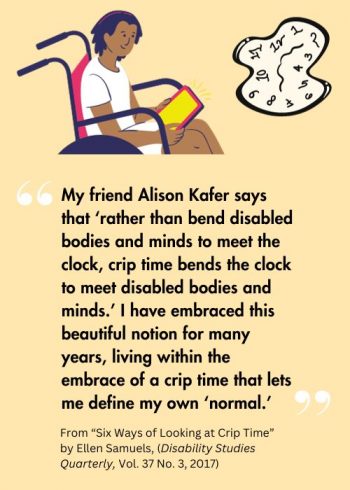Recognizing Crip Time Benefits All Employees
When considering inclusive workplaces, the concept of the “productive employee” needs rethinking, as do employer expectations around time. Workers who experience disability, as well as workers who face other barriers, need more flexibility, which may require revising workplace policies.
Time Experienced Differently with Disability
Crip time suggests that the average time, energy and resources assigned to a task are based on persons who not limited by physical, mental, cognitive or sensory disability.
Oftentimes, a person experiencing disability may require different amounts of time, energy or resources, or additional assistance, to complete a task or activity. An everyday task may result in varying levels of stress, exhaustion, pain or difficulty focusing.
For instance, a person not living with disability could spend forty minutes at home preparing for work and forty-five minutes travelling to work using transit. A person experiencing disability may need an hour and a half preparing for work, perhaps with assistance from a support worker—and longer if a support worker is not available or is delayed. Then, they may have to wait for paratransit, which can involve long wait times, or they may have to navigate streets and public transit that are not always accessible.
Duty to Accommodate Challenged by Perceptions of Productivity
An ongoing study is exploring how employers’ duty to accommodate is still challenged by traditional perceptions of what it is to be a “productive worker.”
Ravi Malhotra, Law Professor, University of Ottawa, and Julia Dobrowolski, Research Assistant, Telfer School of Management-University of Ottawa, are examining the workplace barriers faced by persons experiencing disability. They are focusing on the day-to-day experiences with accommodation of persons experiencing disability and their conceptions of time.
They found that workplaces must reconsider how they view productivity. Part of rephrasing productivity includes understanding crip time and the barriers faced by workers experiencing disability to accomplish daily tasks and activities.
Their research suggests that a better understanding of crip time can lead to more effective solutions at work and dramatic improvements to the lives of persons who experience disability.
“Perhaps one of the most important tools that an employer has in their arsenal is the power to be flexible and include those workers who, for whatever reason, are most productive when working part-time. For too long, part-time employees have been stigmatized and marginalized in the workplace.
“Real inclusion for workers experiencing disability would mean acknowledging the contributions of those working part-time as authentic members of the workplace from whom we have much to learn.”Ravi Malhotra - Professor, Faculty of Law, Common Law Section, University of Ottawa
Crip Time as a Transformative Policy Tool
Companies can be proactive by considering crip time when developing workplace policies. For instance, if travel time is lengthy, stressful and unpredictable for some employees, could they work from home?
Many participants in Malhotra and Dobrowolski’s study excelled professionally when they were given the opportunity to work remotely. Remote work also benefitted their personal health.
Flexible policies might mean more part-time opportunities, including benefits, that could open job postings to more people. When companies consider crip time and offer accommodations, their workplaces become attractive to a larger portion of workers, including parents, caregivers and students.
Ultimately, Malhotra and Dobrowolski’s project aims to develop best practices that employers and disability organizations can readily implement to benefit persons experiencing disability—which will benefit all Canadian workers.
When companies consider crip time and offer accommodations, their workplaces become attractive to a larger portion of workers, including parents, caregivers and students.


